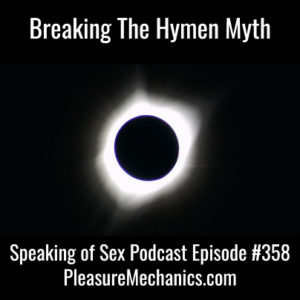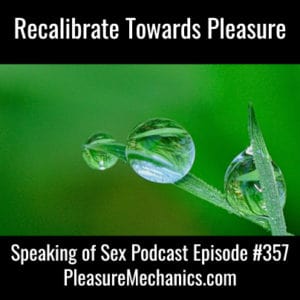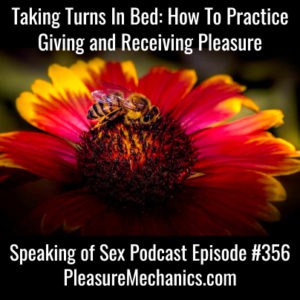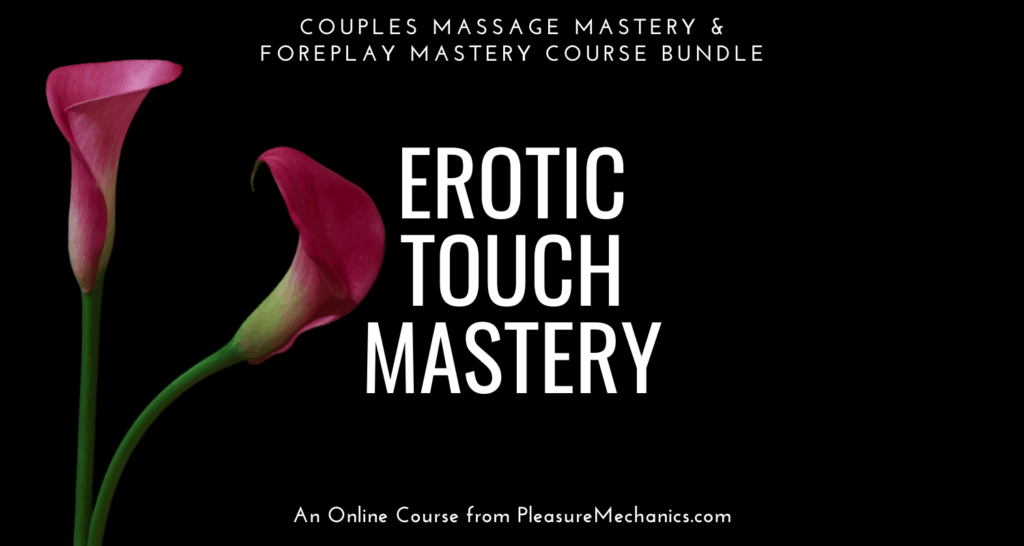Podcast: Play in new window | Download

The hymen myth tells us that the vagina is sealed off by a freshness seal that is only broken upon first penetration. Upon this myth rests the entire idea of female virginity, sexual purity and many other harmful ideas about sexuality that cause endless shame, fear and suffering.
The truth is, the hymen is a flexible membrane that moves and stretches with the rest of the vagina. It is permeable at birth and can remain intact through childbirth. Some people have very thin and flexible membranes, while other bodies have very thick or rigid hymens. In rare cases, surgical intervention may be needed. But for most people, the hymen is simply part of the vaginal anatomy – and through getting to know your own hymen you can better understand how to enjoy your entire sexual system.
Resources On The Hymen Myth:
- Get a guided tour of the sexual system from world renowned sex therapist Cyndi Darnell with the *Atlas of Erotic Anatomy*
- The Virginity Fraud TED talk
- Our Bodies Ourselves on the Hymen Myth
Podcast Transcript:
Podcast transcripts are generated with love by humans, and thus may not be 100% accurate. Time stamps are included so you can cross reference or jump to any point in the podcast episode above. THANKS to the members of our Pleasure Pod for helping make transcripts and the rest of our free offerings happen! If you love what we offer, find ways to show your love and dive deeper with us here: SHOW SOME LOVE
Chris Rose: 00:00 Welcome to Speaking of Sex with The Pleasure Mechanics. I’m Chris.
Charlotte Rose: 00:05 I’m Charlotte.
Chris Rose: 00:05 We are The Pleasure Mechanics, and on this podcast we have soulful, explicit conversations about sex, love, bodies, culture, all the conversations we need to have to move towards a more pleasurable relationship with sexuality, one body at a time on your own terms, and as a globe. Come on over to Pleasure Mechanics, I just said it, a global mission, folks. Come on over to pleasuremechanics.com where you will find our complete podcast archive. While you are there, go to pleasuremechanics.com/free to enroll in our free online course and get started with us. That’s pleasuremechanics.com/free.
Chris Rose: 00:51 If you have been with us for a while and this show has already touched your life and brought more pleasure into your days, come on over to pleasuremechanics.com/love, pleasuremechanics.com/love, where you will find multiple ways of supporting the show and taking a deeper dive with us. All right. On today’s episode, this is an important one. It’s a big one and it’s one that we want to be tender with, because we are going to be tackling some of the foundational myths about sexuality and about the body that have been so persistent. They are global myths and so much rests upon them.
Chris Rose: 01:38 And as we shatter these myths, you might feel a sense of some floor dropping out from beneath you, but I’m here to tell you in advance that is a good thing. These myths need to go. They cause far more suffering than really any other sexual myths I can think of. And as I said, they’re very foundational to a lot of other beliefs and behaviors that have probably caused a lot of suffering in your life and certainly globally for thousands of years. Okay, take a deep breath, everyone, take a wiggle. Here we go. I’ve never said that before.
Charlotte Rose: 02:18 She’s going to wiggle.
Chris Rose: 02:18 I think I might again, take a wiggle.
Charlotte Rose: 02:20 She kind of wiggled her body as she was doing that.
Chris Rose: 02:22 Sometimes you just need a wiggle. All right, here is what we’re here to talk about today. The hymen and virginity myth. We’re here to talk about the fact that hymens do not break or bleed, and virginity is a social construct. Virginity, especially female virginity, is a social construct and what that means we will unpack for you, but it means that there is no physical state, no physiological reality that demarcates virgins from non-virgins. There is no such thing as a virginity check, and the hymen does not break at first intercourse. Okay.
Charlotte Rose: 03:09 So, our culture tells us that the hymen is a membrane that covers the vaginal canal until there is some kind of penetration.
Chris Rose: 03:19 And we have evolved this understanding to think, well, maybe if you’re horseback riding, or doing a lot of athletics you might “break” your hymen. But this idea that there is still a hymen to break is very persistent, and it is talked about like a freshness seal. A seal of purity, like some before and after that the vagina is now open to the world. Is this true?
Charlotte Rose: 03:46 This is not true.
Chris Rose: 03:48 It’s not true.
Charlotte Rose: 03:49 Is this a big idea to unpack?
Chris Rose: 03:52 So, if the hymen is not a freshness seal, what is it? The hymen is a fringe of mucous membrane tissue just on the outside of the vaginal opening, and it is a variable range. It can present like a full circle, almost like a scrunchie all around the vaginal opening, or it can be like a half moon. It can be fringes, it can have one central opening, or multiple openings of different sizes. It can be very, very thin and flexible, or it can be thicker and more durable. All of these variations are normal, and all of these variations present themselves at birth. So, someone born with a vagina has a hymen and at birth it is permeable. As the child grows, as the body grows with hormone fluctuations, the hymen changes.
Chris Rose: 04:53 But at first menses, when menstruation starts, the blood can flow out of the vagina through the hymen. Very, very few people with vaginas are born with a hymen that is so thick and inflexible and without an opening that it requires surgical intervention. But this is a very rare case and there’s very rare cases of fluctuations in all anatomy, so we should expect that. But for most people, the hymen is a structure. It’s part of the vulva, it’s part of the vagina. You’re born with it, it grows with you and it does not break. It does not break, just like all the other parts of the body. There’s no freshness seal that when a toddler has their first meal, it like punctures in the throat and you’re like, “Whoa, the baby has had its first meal.”
Chris Rose: 05:43 This is not part of the body, and we have known all of this in medical textbooks, by the way, since the beginning of the 1900, 1906, the doctors were talking about the hymen and variability, and yet, these myths persist. And we’re here to think about why, think about the repercussions of these myths and how different this is. So, just notice in your body now, like how different an understanding of the hymen this is. Over this freshness seal, plastic wrap image we are sold.
Charlotte Rose: 06:19 Yeah, we have such a strong cultural idea that the hymen is there, and then it is broken at first penetration, and then we are different. We have gone from pure to impure.
Chris Rose: 06:32 Virgin to not a virgin, yeah.
Charlotte Rose: 06:35 And that your value is diminished. This is a really deep cultural idea that a lot of us really experience as true. And this is where a cultural story is so powerful, because it influences our actions, our behavior, our thoughts about ourself and others. It is so profound when we really begin to unpack this, and what changes when you know that your hymen is with you for all of your life? Nothing is broken. You are whole and complete from birth to death. It’s profound.
Chris Rose: 07:16 I love where you’re taking this, and let’s just pause for a moment because if it doesn’t break, what about the blood?
Charlotte Rose: 07:22 Yeah.
Chris Rose: 07:22 What about the blood that some people do experience at first intercourse or many times over many incidents of intercourse. So, there’s that. There’s the bleeding when the hymen does tear a little bit, or when the vaginal membranes tear. So, what about the bleeding? And some people experience this bleeding during sports, or horseback riding, or notice this bleeding, and then freak out that they’re “no longer” a virgin, or someone’s no longer a virgin and they experience this bleeding multiple times with intercourse, and can’t figure out what’s going on there. So, that bleeding is because the mucus membranes of the vagina are quite delicate tissue.
Chris Rose: 08:09 Just like the inside of your cheek, when subject to injury, either slight or extreme, they can break and bleed, and then heal again. It is resilient tissue, and some people’s hymens, as we talked about, are very, very thin, whisper thin and kind of thin out with hormonal changes and then are barely visible as like a slight fringe around the vaginal opening. I call this the fringes to the party tunnel. It’s like, “Hello there.” It’s this beautiful kind of petal like fringes, and other people have a thicker hymen that’s more like a membrane, more of like the head of a drum perhaps.
Chris Rose: 08:52 I have a hymen like this and it’s kind of a half moon on the bottom of the vagina, and I want to take a minute here. Like with all of these variations, there are different ways of interacting with our bodies, but we don’t know about any of these because we are sold this lie. I’ve never spoken to a woman who grew up who came of age with hymen awareness, who was so aware of her own parts that she knew what her hymen was, where it was, how it responded to arousal over time. And so, we get these emails of people who have been married 10 years and still have painful intercourse, and there’s a lot of reasons for painful intercourse, but one of them is a kind of a persistent hymen.
Chris Rose: 09:40 Some people, different positions feel better or worse because of the position of their hymen. So, the hymen is part of the vulva and the vagina to get to know intimately, to come into awareness of. But we are denied that knowledge because of this persistent cultural myth of the hymen as a freshness seal. And now, it is time to point out all of the other myths, and misinformation, and suffering that rests on that freshness seal of the hymen. Virginity, female virginity, this idea of being a virgin and then not being a virgin, being pure and then tainted. Virginity checks, which are used globally as a method of social control against women.
Chris Rose: 10:30 The social narrative about virginity is a myth, is a social construct, is an idea that we have been taught, that we have been taught as true. There is no physical differentiation between someone who has been penetrated and not penetrated, and penetrated by what? Right? All of our mythology of the virginity requires this idea of penis and vagina intercourse, and there is this before and after to a woman’s status and her body, before and after a penis has entered her.
Charlotte Rose: 11:07 And her worth.
Chris Rose: 11:09 Her worth, her safety, her value within the community, her value to a potential husband. It goes on and on and on.
Charlotte Rose: 11:18 The way we think about virginity influences us in so many ways, from how we talk to our girls about making sure you preserve and protect your body and not give anything away.
Chris Rose: 11:30 Or, don’t let something be taken from you, right? This purity protection mindset.
Charlotte Rose: 11:37 All the way up to honor killings that happened in certain parts of the globe, if there is a mistrust that on the wedding night virginity is not “intact,” which is a reference to the hymen. So, this myth is so powerful and has really profound and serious impacts on lives in all sorts of ways. So, it’s urgent and important that we unpack this and also tell other people about this.
Chris Rose: 12:05 Right, this isn’t just a casual sexual myth that … like blue balls, even that’s not casual and benign, but the virginity myth, the hymen myth really is the foundation of so much sexual control and misogyny, and when we think about sexual repression, it starts here. It starts in this idea that the female body is pure until it is penetrated, that the body has changed upon penetration, that you have something to protect and not give away. Once that is taken from you, you are tainted, and I get these emails every day, every day. And it’s from people from Kansas to Kuwait who are panicking in some cases about their safety, because they are worried they will not bleed on their wedding night.
Chris Rose: 12:56 So, this isn’t some medieval thing of hanging the bedsheets out of the castle window to proclaim your daughter a virgin-
Charlotte Rose: 13:04 With blood on it.
Chris Rose: 13:05 … because that happened too, this is a modern day issue of sexual myth that is designed to control a population. And so, what I want to leave you with is kind of the thought exercise. So, start unpacking for yourselves how much rests upon this idea of the virgin girl, how much rest upon it, why has it been reinforced over and over again? And so, when I say virginity is a social construct, what a social construct means is an idea that is reinforced by multiple systems of knowledge within a culture. So, the idea of the female virgin, there’s no biological thing as a virgin, there’s pregnant and not pregnant. Those are states you can be or not be. Pregnancy is a state.
Chris Rose: 13:56 It is a measurable state. Virginity is not a state. It is not something that is measurable and yet people are still subject to virginity checks for employment status in countries in the world today. We recorded this episode in response to a news article about a performer here in the States subjecting his teenage girl to virginity checks at the gynecologist to see if she was sexually pure. We know all of this. We can see all of this in the culture, and I want all of us to be reflecting on how these myths are propagated. So, how the medical industry, how religion, how cultural ideas, pop songs. All of this cultural knowledge replicates itself and then we don’t know the bodies we are born into, right?
Chris Rose: 14:51 Like most people listening to this podcast either have a hymen or have touched a hymen or two, and yet we don’t even know what we have or are touching because of this lack of clear information and because of how much space the myths and lies take up. That is what is always striking to me. It’s like when you look at your life narrative, you look at your suffering, you look at your sexual arc, if we look at all of our sexual stories, how much space is taken up by suffering created by these myths? I know for myself, I was assaulted as a child. I was raped at 13, I didn’t think I had anything left to protect. All of the voices in my life were telling me that I was already used, and this changed how I behaved in my body.
Chris Rose: 15:45 If instead I had been surrounded by a council of wise women who is saying like, “Oh, baby girl, you’ll be okay. We can heal from this. You’re resilient. Your body is yours. You can choose who to share it with now.” We are not taught these messages, and so now, instead of a hymen, we’re calling it the vaginal corona. A group of feminist doctors out of Europe have called it the vaginal corona, and I think that’s quite beautiful. A corona being like a halo of tissue at the opening to the vagina, and instead of virginity we’re talking about sexual debuts, or sexual initiations, sexual coming of age.
Chris Rose: 16:29 What changes in our minds and our hearts, and how we approach these conversations with our children, our grandchildren, with our friends when we start replacing the myths with new language that reflects the sexual culture we want to be building and living in? So, I know our daughter is five now, she will never have a virginity to lose because she will not learn that concept. She will have the tools and information to make choices about her sexual coming of age, about her development into a healthy sexual adult. So, let’s all reflect on this, and the next time you hear the words hymen or virgin, I want you to perk up and start conversations about this.
Chris Rose: 17:16 It’s awesome at a dinner table with friends when you hear the word virgin or the word hymen, and you will hear them. There was just so many stories in the news about the hymen, and virginity comes up all the time. When you hear these concepts, correct people and be like, “There’s no such thing as virginity, right? Like what makes a virgin a virgin? There’s no such thing as the hymen.” Blow your friend’s minds with this because that’s how sexual knowledge gets spread. We’re sharing it with you here now. You can then share it with people in your lives and engage in the conversations that you wish you had heard when you were a kid. What would have changed in your life if you were equipped to make choices about your own sexual debut?
Charlotte Rose: 18:04 And another thing you could do is explore the hymen nearest to you that you love, whether that is your own or your partners. Many of us have no idea what that looks like and now that you have some more information, explore, check it out. See what’s there, because we don’t know, and it’s interesting. And perhaps that will influence how you make love or not depending on angles and what feels good to you, perhaps it won’t. But it’s valuable and important to know what we have in our bodies or those we love.
Chris Rose: 18:38 And the whole mirror between the legs looking at yourself thing can be kind of intimidating for folks. So, different people have different pathways into self exploration. Some people like feeling it out with their hands first. The doctors would call it palpating, but just using your fingertips to not masturbate but explore your vulva and figure out what all the parts are, and notice their interconnection. Notice the connection between your perineum, and your vaginal opening, and your lavia, and your clitoral hood, and your clitoris. Come to know your sexual system, but you can just start with this knowledge and then move into direct exploration if you wish.
Chris Rose: 19:21 But this knowledge is enough to change a lot, to change a lot of attitudes and perspectives, and I want to acknowledge that this one is mostly knowledge you will pay forward. Most of us cannot go back and change our own sexual debuts, change how we thought about our own virginities.
Charlotte Rose: 19:42 Yeah, it’s possible to rewrite some of the stories in your mind and your heart from the past. You can’t obviously redo the actual physical reality of the past, but you can create a different narrative of what happened to you or what you chose or didn’t choose. There’s so many different ways we can relate to our stories differently with new knowledge.
Chris Rose: 20:05 Yeah.
Charlotte Rose: 20:06 So, we hope that this has given you some new information and some new approaches and attitudes to your body, or those you love, and that slowly idea by idea, myth by myth, we unravel all of these like painful, and oppressive, and hurtful myths, and replace them with something that is empowering, filled with correct information and knowledge. And in doing so that we can have more freedom in how we relate to our bodies and the acts that we participate in, and that they can ultimately be more pleasure, and joy, and ease in how we experience ourselves and each other.
Chris Rose: 20:48 If you want to know more about the hymen, get more information, the show notes page will be full of links. Some people have asked recently, what’s a show notes page. So, on the podcast player of your choice, you should be able to click through on the podcast title and that will bring up a show notes with all sorts of links, and the transcripts, and other resources for you. So, check that out. Leave us a rating or a review on the podcast player of your choice. It actually does make a big difference for us in reaching more listeners, and be sure to come over to pleasuremechanics.com/free and enroll in our free online course, so we can be in touch with you and you can take a deeper dive with some of our foundational ideas.
Chris Rose: 21:35 Yes, pleasuremechanics.com/free. Remember, we are a community supported erotic education. So, show us some love at pleasuremechanics.com/love. We love you. I’m Chris.
Charlotte Rose: 21:49 I’m Charlotte.
Chris Rose: 21:50 We are the pleasure mechanics.
Charlotte Rose: 21:51 Wishing you a lifetime of pleasure.


